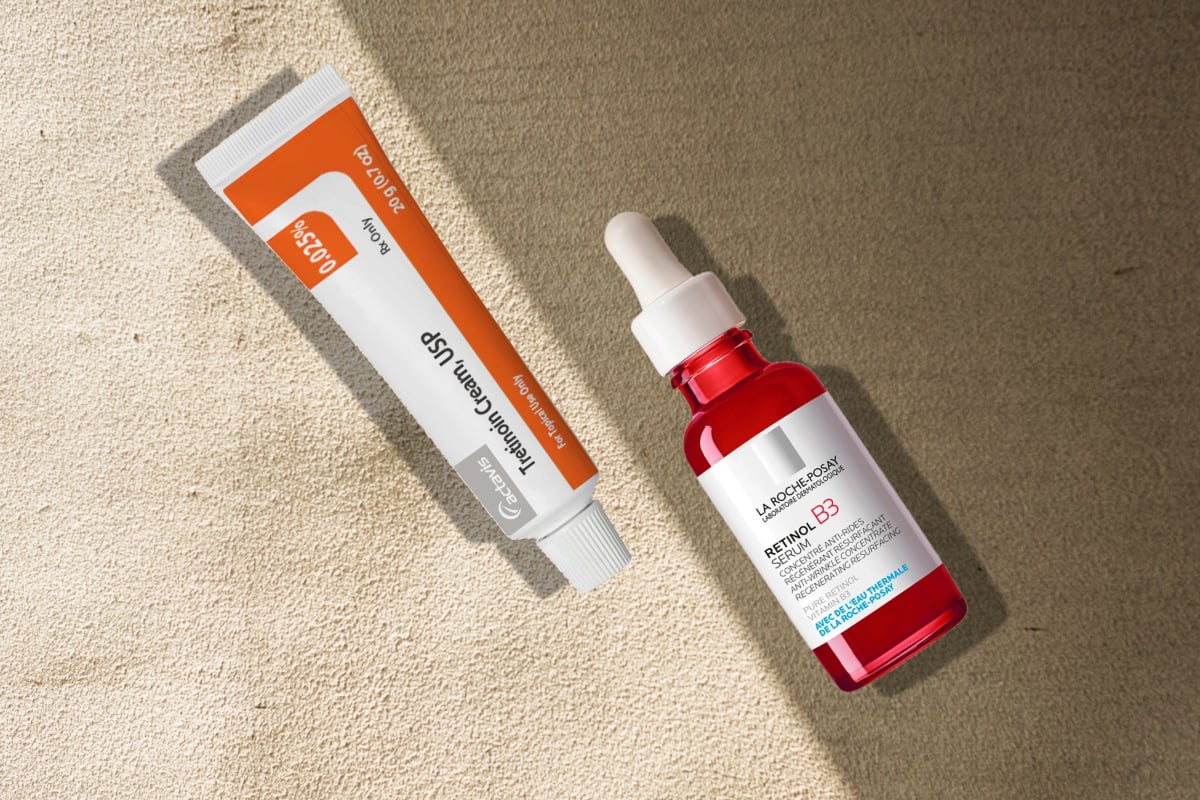- Bakuchiol is a natural and gentle alternative to retinol that share the same skin-renewing and anti-aging benefits.
- Both bakuchiol and retinol are antioxidants that promote cell turnover and collagen production, targeting similar skin concerns, including fine lines and wrinkles, dark spots, sun damage, and acne.
- Studies have shown that bakuchiol is nearly as effective as retinol and also gentler and better tolerated by the skin.
- Bakuchiol can be applied twice daily, while retinol should only be applied once at night as it breaks down quickly in sunlight.
You’ll often see bakuchiol called plant-based (or botanical) retinol by skincare devotees, and the reason is that it’s been proven to have much the same effects but with considerably less irritation. Yes, bakuchiol does all the hard work of stimulating cell renewal and promoting firm and radiant skin without the common adverse effects caused by retinoids. Even though the research on it is considerably poorer compared to that of vitamin A, bakuchiol has already replaced retinol in quite a few skincare routines. Read on as we weigh in on the differences between retinol and bakuchiol so you can make the best decision for your skin.
What is retinol
Retinol is a vitamin A derivative within the family of retinoids.[1] When applied to the skin, it penetrates the epidermis and is converted by the body into the active form of vitamin A, retinoic acid, which works to stimulate cell turnover and increases collagen and hyaluronic acid production. As an antioxidant, retinol also protects the skin from environmental damage and reduces the degradation of proteins like elastin and collagen. For skincare, retinol has been mostly studied to diminish fine lines and wrinkles, even skin tone, smooth rough texture, unclog pores, and balance excess sebum.[1]
What is bakuchiol
Bakuchiol is a natural extract from the Psoralea corylifolia plant leaves and seeds. It’s often hypothesized to be a natural version of retinol since it has nearly the same impact on the skin. Studies show that bakuchiol is an antioxidant to neutralize free radicals and has anti-inflammatory properties.[2] It also stimulates collagen production and cell turnover, improving skin tone and diminishing wrinkles appearance.[3]
Retinol vs. bakuchiol
At first glimpse, you can clearly see that retinol and bakuchiol have quite some skincare effects in common and target similar skin concerns:
- Anti-inflammatory and antioxidant: Both retinol and bakuchiol work to scavenge free radicals and reduce inflammations. However, bakuchiol demonstrated high antioxidative powers compared to retinol.[4]
- Promote cell turnover: They encourage the skin’s natural renewing process by speeding up the rate at which the old cells are replaced by new ones.[1][3]
- Increase collagen: Retinol and bakuchiol have both been studied to diminish fine lines and wrinkles and firm the skin by boosting collagen production and preventing protein degradation.
- Treat acne: Both ingredients have antimicrobial properties proven to treat inflammatory and non-inflammatory acne.[5][6]
- Lighten skin discoloration: They target melanin (skin-darkening pigment) and visibly reduce hyperpigmentation.[7][8]
There’s also this particular study by the British Journal of Dermatology that adds weight to the idea that retinol and bakuchiol work in similar manners and have much the same impact on the skin. After comparing both ingredients in a 12-week clinical trial, researchers found that a 0.5% bakuchiol cream applied twice daily provided similar benefits in terms of improving aging signs and reducing skin discoloration to a 0.5% retinol cream applied once daily.[9] Yet, the bakuchiol cream turned out to be more tolerable, less irritating and caused less burning, redness, and dryness than retinol. The researchers concluded that bakuchiol could be a solid alternative to retinol, especially for people whose skin reacts to retinoids, that can be used to address skin aging without irritation.
But here’s the thing with this study: the bakuchiol cream was used two times a day while retinol was only once, so think how the results would look if both products were applied just as often.
By the same token, another study demonstrated that bakuchiol functions as an anti-aging compound through retinol-like regulation of gene expression, including upregulation of types I and IV collagen. Based on a 12-week clinical trial, bakuchiol had significantly improved the look of fine lines and wrinkles, pigmentation, skin elasticity and firmness, and reduced photodamage without the usual side effects caused by retinol.[10]
However, it’s important to note that retinol and bakuchiol do not work in the exact same way, and there are some key differences between them:
- Bakuchiol doesn’t act via retinoic acid receptors, which are those that bind to retinoids and regulate changes in cell differentiation and proliferation (two processes that control the formation and death of skin cells).
- One study suggests that bakuchiol has higher antioxidant activity and is more effective at neutralizing free radicals and slowing down the activity of the enzymes that break down collagen and elastin.[4]
- Bakuchiol is not photosensitive and does not break down when exposed to UV. On the other hand, retinol gets easily deactivated by light. Because retinol breaks down in sunlight, it is not recommended to be used during the day since it can be rendered ineffective. Bakuchiol is not photosensitive, so it can be used in AM and PM without losing potency.
- Bakuchiol can be used by breastfeeding or pregnant women, unlike retinol which is not recommended in any of these cases. However, it is always better to consult your doctor before adding new skincare products to your routine if you are pregnant or breastfeeding.
- Compared to retinol, bakuchiol can be mixed with any other potent skincare ingredient. Retinol is vulnerable, so it shouldn’t be combined with AHAs/BHAs, benzoyl peroxide, or vitamin C.
So which one is better?
Even though retinol and bakuchiol are indeed very much alike, it’s still difficult to compare them in terms of potency. There are a couple of studies that show the two perform similarly in improving all forms of aging signs when used at the same concentration, but that’s pretty much all of it. The results are also interpretable and do not offer clear percentages of the improvement rate in skin conditions (such as wrinkles, dark spots, and rough texture) after the use of retinol and bakuchiol.
It’s true that bakuchiol is milder and more tolerable, but the research on it is much less consistent than that on retinol. So as much as we like to give credit to bakuchiol, retinol still gets the upper hand since it has been explored more in the dermatological field. On the other hand, bakuchiol is a much better choice for people with sensitive skin who can’t tolerate retinol or for pregnant or breastfeeding women.
Can you use retinol and bakuchiol
Why choose between them when you can use both? Retinol and bakuchiol are two ingredients that complement each other and can be used together to maximize the results. As both address similar skin concerns, they work synergically to minimize aging signs, smooth rough texture, and brighten dull and hyperpigmented skin. Of course, you should pair them in your skincare routine only if your skin tolerates both actives and you don’t experience irritation. Here’s how you can use retinol and bakuchiol together without compromising your skin health:
- Have both of them in the same product.
- Use them in different products at alternative times, like bakuchiol in the morning and retinol at night.
- Use them at the same time in different products by applying a bakuchiol serum and following up with a retinol moisturizer, or vice-versa.
The takeaway
Given all the above, bakuchiol is indeed a great alternative to retinol. It’s all-natural and acts more delicately on the skin without the common irritation and sensitivities caused by retinoids. However, it’s very difficult to beat retinol when it has so much supporting evidence in skincare, especially since the studies on bakuchiol are not that abundant.
So unless your skin has a sensitivity to retinoids or you’re pregnant or breastfeeding, you should stick to retinol for the best-in-class results. Otherwise, you can replace retinol with bakuchiol. Better still, if your skin can tolerate it, you can use both for maximum benefits.
Read next: How To Use Retinol On Sensitive Skin Without Irritation
Footnotes
Women’s Concepts uses reliable sources, including dermatologists’ insights, clinical trials, and scientific journals, to find accurate information and support all the facts shared in our articles. All statements and claims have clear and legit references. Read our editorial policy to learn more about our sources of information, our process of researching and fact-checking the content, and how our team strives to keep all articles updated, completed, and trustworthy.
- Zasada M, Budzisz E. Retinoids: active molecules influencing skin structure formation in cosmetic and dermatological treatments. Postepy Dermatol Alergol. 2019 Aug.
- Adhikari S, Joshi R, Patro BS, Ghanty TK, Chintalwar GJ, Sharma A, Chattopadhyay S, Mukherjee T. Antioxidant activity of bakuchiol: experimental evidences and theoretical treatments on the possible involvement of the terpenoid chain. Chem Res Toxicol. 2003.
- Department of Cosmetic Technology, International Journal of Advance Study and Research Work, Bakuchiol: A Retinol like Structure in the Field of Cosmetics, July 2020
- Bluemke A, Ring AP, Immeyer J, Hoff A, Eisenberg T, Gerwat W, Meyer F, Breitkreutz S, Klinger LM, Brandner JM, Sandig G, Seifert M, Segger D, Rippke F, Schweiger D. Multidirectional activity of bakuchiol against cellular mechanisms of facial ageing – Experimental evidence for a holistic treatment approach. Int J Cosmet Sci. 2022 Jun.
- Brownell L, Geen S, E Y, Lee WL. A Clinical Study Evaluating the Efficacy of Topical Bakuchiol (UP256) Cream on Facial Acne. J Drugs Dermatol. 2021 Mar 1.
- Callender VD, Baldwin H, Cook-Bolden FE, Alexis AF, Stein Gold L, Guenin E. Effects of Topical Retinoids on Acne and Post-inflammatory Hyperpigmentation in Patients with Skin of Color: A Clinical Review and Implications for Practice. Am J Clin Dermatol. 2022 Jan.
- Kang MC, Lee JW, Lee TH, Subedi L, Wahedi HM, Do SG, Shin E, Moon EY, Kim SY. UP256 Inhibits Hyperpigmentation by Tyrosinase Expression/Dendrite Formation via Rho-Dependent Signaling and by Primary Cilium Formation in Melanocytes. Int J Mol Sci. 2020 Jul.
- Sato K, Morita M, Ichikawa C, Takahashi H, Toriyama M. Depigmenting mechanisms of all-trans retinoic acid and retinol on B16 melanoma cells. Biosci Biotechnol Biochem. 2008.
- Dhaliwal S, Rybak I, Ellis SR, Notay M, Trivedi M, Burney W, Vaughn AR, Nguyen M, Reiter P, Bosanac S, Yan H, Foolad N, Sivamani RK. Prospective, randomized, double-blind assessment of topical bakuchiol and retinol for facial photoageing. Br J Dermatol. 2019.
- Chaudhuri, R.K. and Bojanowski, K. (2014), Bakuchiol: a retinol-like functional compound revealed by gene expression profiling and clinically proven to have anti-aging effects. Int J Cosmet Sci, 36: 221-230. https://doi.org/10.1111/ics.12117




![Does resveratrol in red wine benefit your skin? While sipping on a glass of red wine can be a delightful experience, relying on it for skincare benefits is not the best idea. Sure, red wine contains a smidge of resveratrol, but let's put things into perspective. The concentration of resveratrol in red wine is relatively low. Red wines, specifically Pinot noir from France, typically contain 0.361-1.972 mg of resveratrol per liter.[8] To hit that reference dose of 500mg of resveratrol, you'd need to drink a lot of wine. We're talking about downing anywhere from 100 to 1000 glasses per day. It's a scene straight out of a wine lover's wildest dreams, but definitely not the healthiest approach. Resveratrol Benefits for Skin](https://womensconcepts.com/wp-content/uploads/2022/03/Resveratrol-Benefits-for-Skin.jpg)
